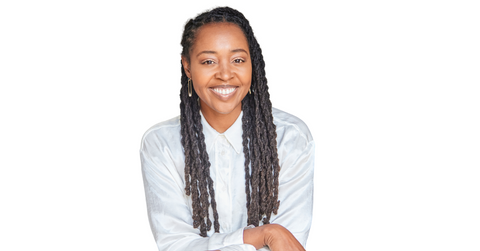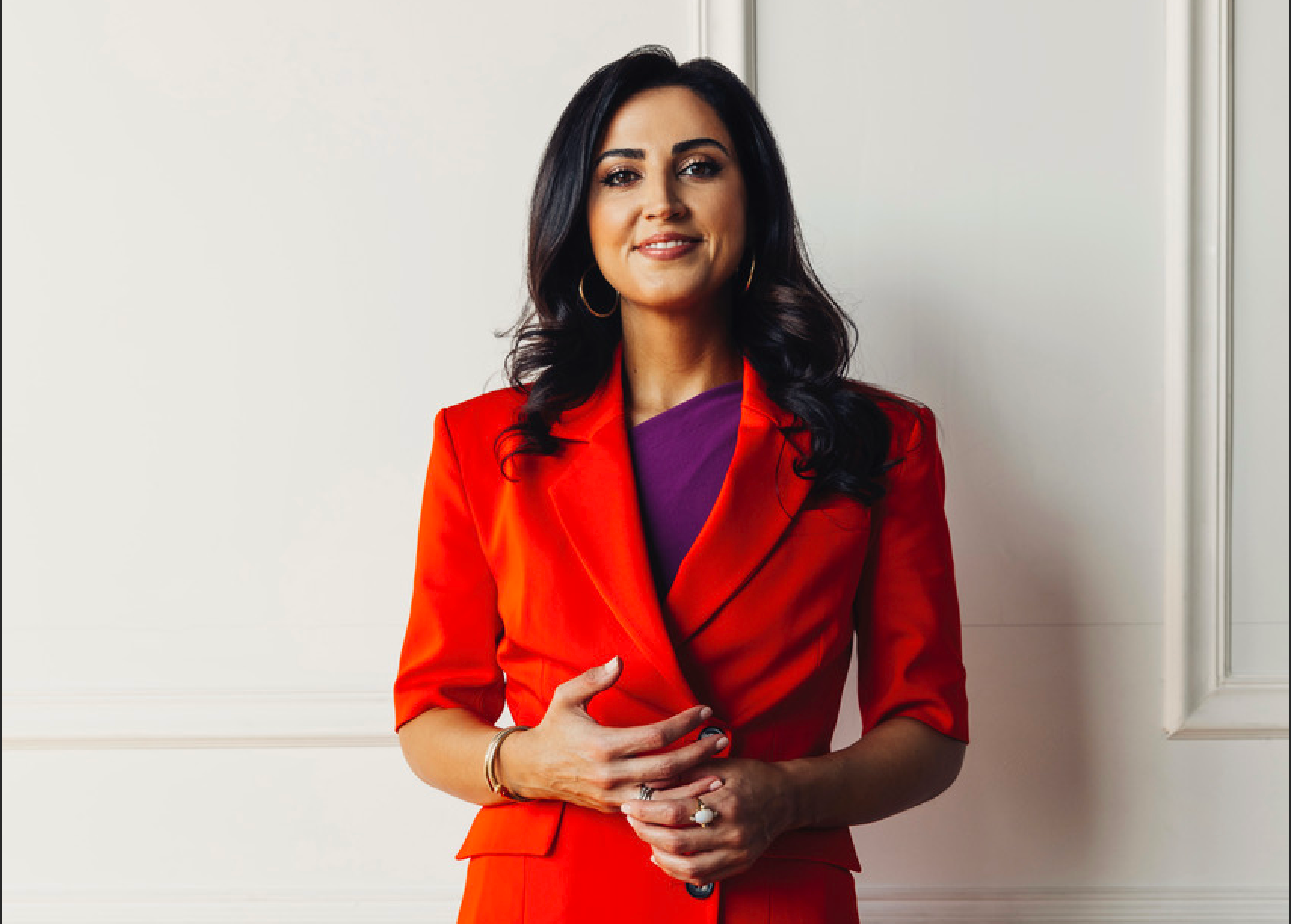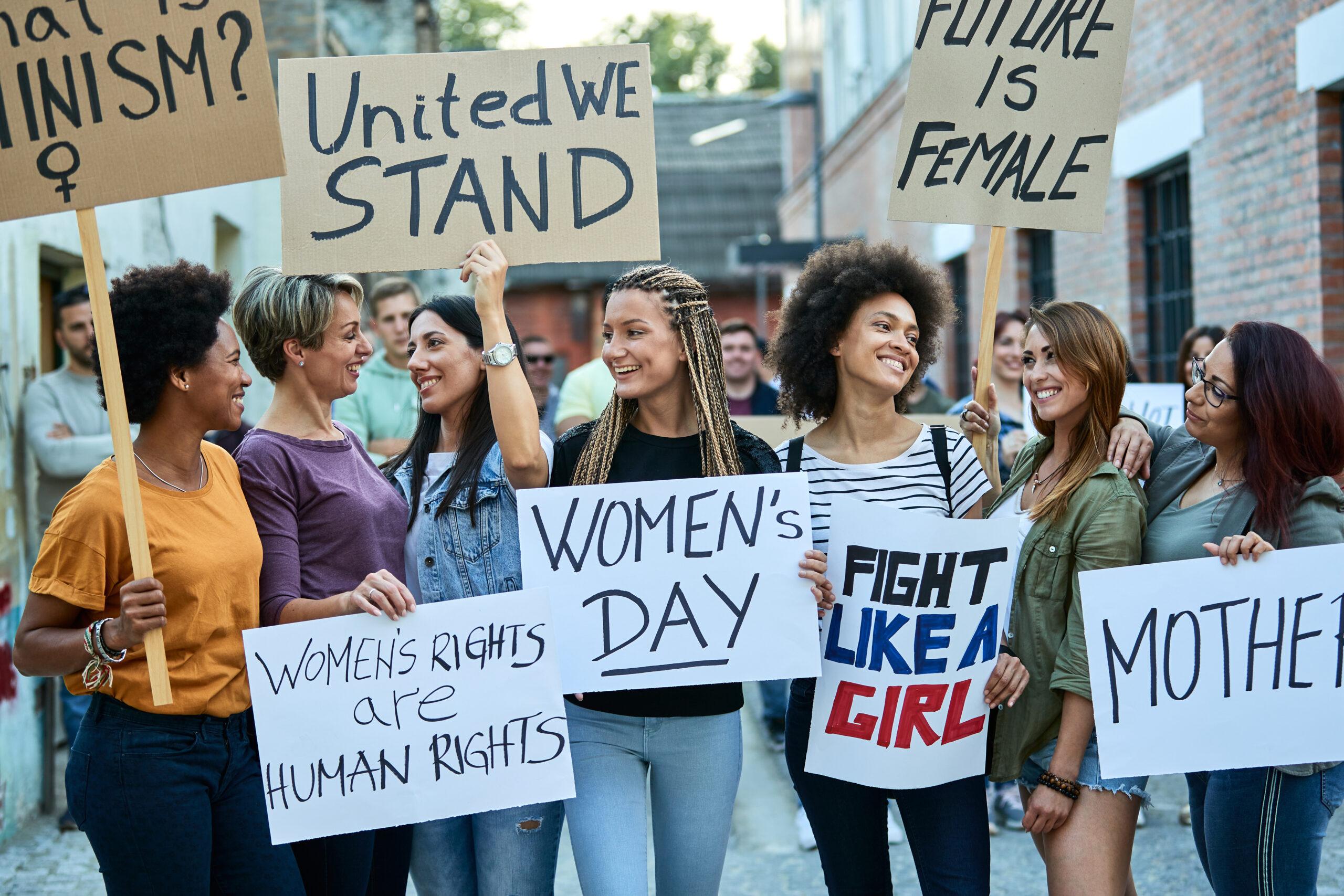Dr. Lakeysha Hallmon doesn’t just stand on business, she cultivates it.
Dr. Lakeysha Hallmon, affectionately known as Dr. Key, is a trailblazer and village-builder at the intersection of education and business. With a profound love for community and a guiding mantra of “support is a verb,” Dr. Key passionately inspires and educates to help forge pathways to generational health and wealth. As the Founder and CEO of The Village Market (TVM) and the Executive Director of Our Village United (OVU), she pioneered an innovative Village model that facilitated 8.3 million dollars in sales for Black businesses according to stats provided by TVM which has transformed the lives of thousands of Black entrepreneurs globally.
Dr. Key’s commitment to elevating individuals towards a village-minded approach is palpable, and in an interview with Her Agenda, she delves into the transformative power of community building and how The Village Market and Our Village United’s ELEVATED CITIES Tour in partnership with Mastercard are instrumental in curating spaces where Black entrepreneurs not only survive but truly thrive.
Her Agenda: I know you are very passionate about creating community and curating spaces for Black entrepreneurs to thrive. What drew you to this transformative work? How did you know you were called to do it?
Dr. Lakeysha Hallmon: What I’ve known to be true for some time is that community is the way. If we as a people are connected in purpose, bound by intentionality, we are protected and we can also be elevated. I know that being liberated economically can transform our current existence and also the future existence of our work. I’ve heard my grandmother say that ‘it takes a village’ my whole life. And with this village model, I’ve just had a clear vision that this is it. This is the way, this is the work that I must do.
But I must say, it is not something that I woke up in the morning and said, ‘I think this is what I should be doing with my life.’ If you asked me 10 years ago, what I wanted to do with my life, I would have shared that I want to open charter schools all over the world. I’m deeply passionate about education, still passionate about education. But 10 years ago, that would have been my truth. And then I received a spiritual download, that my classroom had to change, it had to be transformed. I had to help create a vision, a way out of poverty. I knew that if we could be economically liberated, we could control what happens in our communities and control the future of our families. I had this vision of creating a beloved community around entrepreneurs. But I had no idea I’d be doing this. I’m very grateful that I’ve received this download and this calling that this is my life’s work in the present.
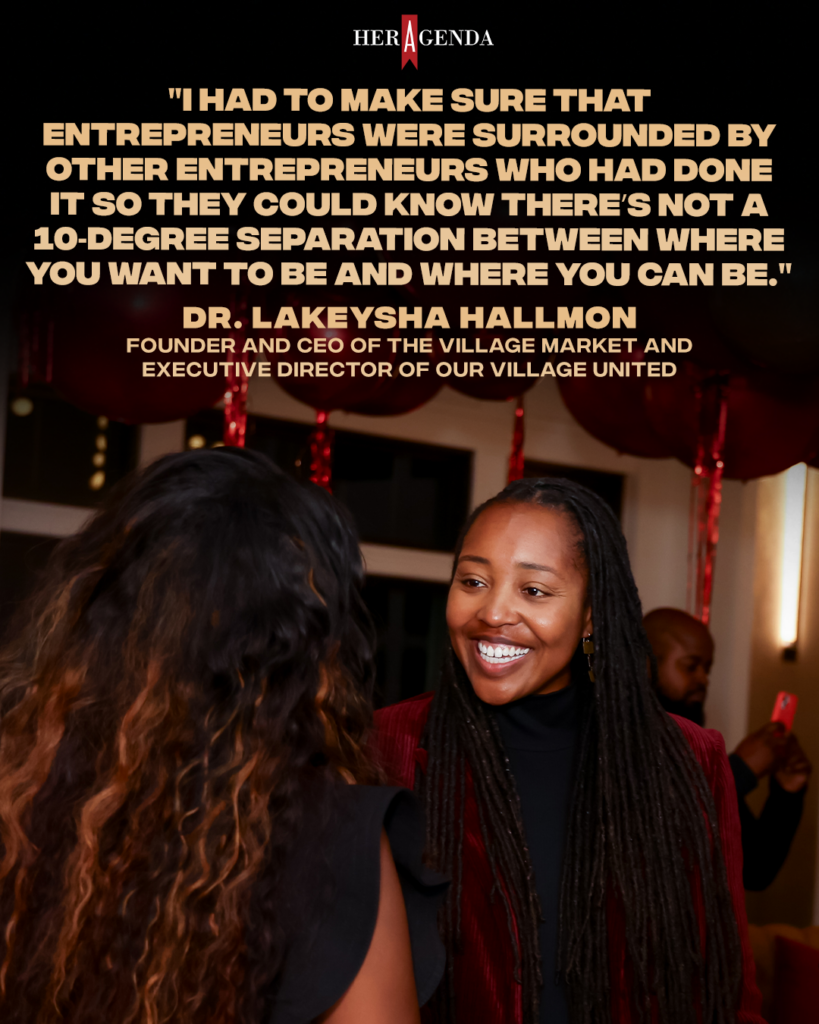
Her Agenda: You were certainly meant to receive that download. Bringing people together is such a key element of this work. Recently, you partnered with Mastercard to launch ELEVATED CITIES, a seven-city tour that supports solopreneurs and microbusinesses through targeted capital grants, community building, professional services, and wellness support. Can you please share more about the impact of this tour?
Dr. Lakeysha Hallmon: I want to take us back a little bit before we get to the tour because there’s something that happened first. So we all experienced this thing called the pandemic. In 2019, before the pandemic, The Village Market [est. in 2016] was doing nighttime marketplaces and had grown exponentially. Entrepreneurs were flying into Atlanta from around the country to participate because they heard from people that this market was special, it was different. They knew they would not be treated as “just” a vendor, but they would be treated as an entrepreneur. Their business may operate at a six-foot table tonight, but we have a clear vision to grow them, too. We were on a wave and then, a pandemic happened. The pandemic shuttered my marketplaces and the entire village market model since we were created to convene in person. But the beautiful thing is, that I always believe that light can come out of darkness. That darkness made me have to step back and pivot, asking myself ‘What am I going to do if I can’t do the thing that I do so well, which is convening people?’
I started to receive many emails from entrepreneurs asking for advice on how to apply for and secure Paycheck Protection Program (PPP) loans, and how to strengthen their infrastructure and operations to secure more funding. That’s when I realized that there was a deeper problem: We’ve been positioning entrepreneurs to be ready for a buying customer, but were we positioning entrepreneurs to make sure their operations were tight? Are they loan and capital-ready? Are they positioned to weather a storm or something that can be as decimating as the pandemic? That’s when I got the vision of elevating my own business and creating a robust curriculum for entrepreneurs. The end goal was that I’d still create marketplaces, but I had to make sure that entrepreneurs had the resources that they needed. I needed to make sure I had best-in-class facilitators and trainers who had a direct throughline to these entrepreneurs. I had to make sure I raised money to be able to deploy grant opportunities for entrepreneurs. But I did not have this full thought-out plan before the pandemic happened.
That’s when I birthed this idea called ELEVATE. I wanted Elevate to elevate entrepreneurs’ consciousness, connectedness, and their businesses. And fast forward, we’re doing exactly that and it’s so exciting. I’ve seen [entrepreneurs] operations grow from $20,000 to well into six figures. Entrepreneurs received some of their first grants from us. We’ve helped entrepreneurs get their pitch decks ready so they can be prepared to have deeper conversations with Target, Mahogany, and other notable brands. These entrepreneurs have shared with us through their self-reporting that their business model and overall operations have grown. They’re hiring people, meaning there’s a direct connection to what’s happening in the community. And they’re able to now see themselves beyond hustling.
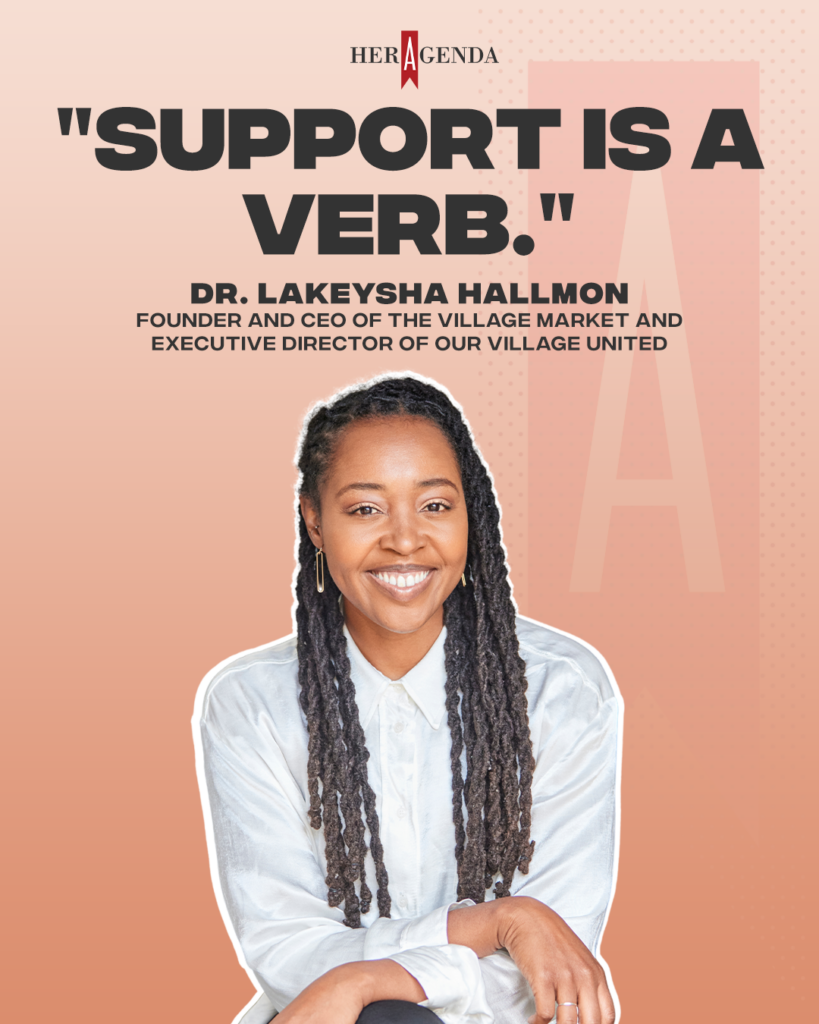
Her Agenda: Tell us more about that.
Dr. Lakeysha Hallmon: After we got the first group of Elevate off the ground, I had the vision of going on a national tour. In 2020, I wrote the vision on paper saying I wanted to go on a national tour and I wanted it to be inspiring. I wanted entrepreneurs to pitch before people like Tabitha Brown, I wanted MasterCard to be at the table, and I wanted to supply over $500,000 to entrepreneurs. Fast forward to this year, we served over 400 entrepreneurs, we gave out $475,000 in grants, and we came to 25 different states. My vision was so clear that if I could elevate the mindset of people, then the business would follow. I had to make sure that entrepreneurs were surrounded by other entrepreneurs who had done it so they could know there’s not a 10-degree separation between where you want to be and where you can be. These are people that look just like you, that started just like you. That’s why representation matters.
Her Agenda: I couldn’t agree more. It’s all about the mindset and being able to show people the rooms that they can be in. That representation piece is so important. Your website points out that 96% of underrepresented businesses are ‘solopreneurs’ or have no paid employees. I’d love to hear more about the goal of growing solopreneurs into multi-employee businesses.
Dr. Lakeysha Hallmon: I targeted solopreneurs because that’s what I was when I first started. I never tried to build things that I didn’t know anything about. If it’s personal to you, I think the intentionality is different. I just remember when it was just me and I had this vision of creating The Village Market, but my gifts could only take me so far. If I just relied on myself, there’s no way I would be where I am today. I had to target people who had the passion, the intestinal fortitude, and good ideas. And I had to tell them, that you are not supposed to build alone, you are not supposed to be the most talented person in your village. You must be surrounded by people whose gifts are different than yours, that compliment you.
I knew if I could raise up this generation of entrepreneurs, 96% of whom are Black and brown solo founders, I knew that I could begin to shift the narrative of community. If I could just get these entrepreneurs to get the operations tight, and get them positioned to get funding where they can finally get a COO, where they can get a CMO where they can hire a very good accountant where they can have a small business attorney on speed dial, I knew that I can help these operators build businesses.
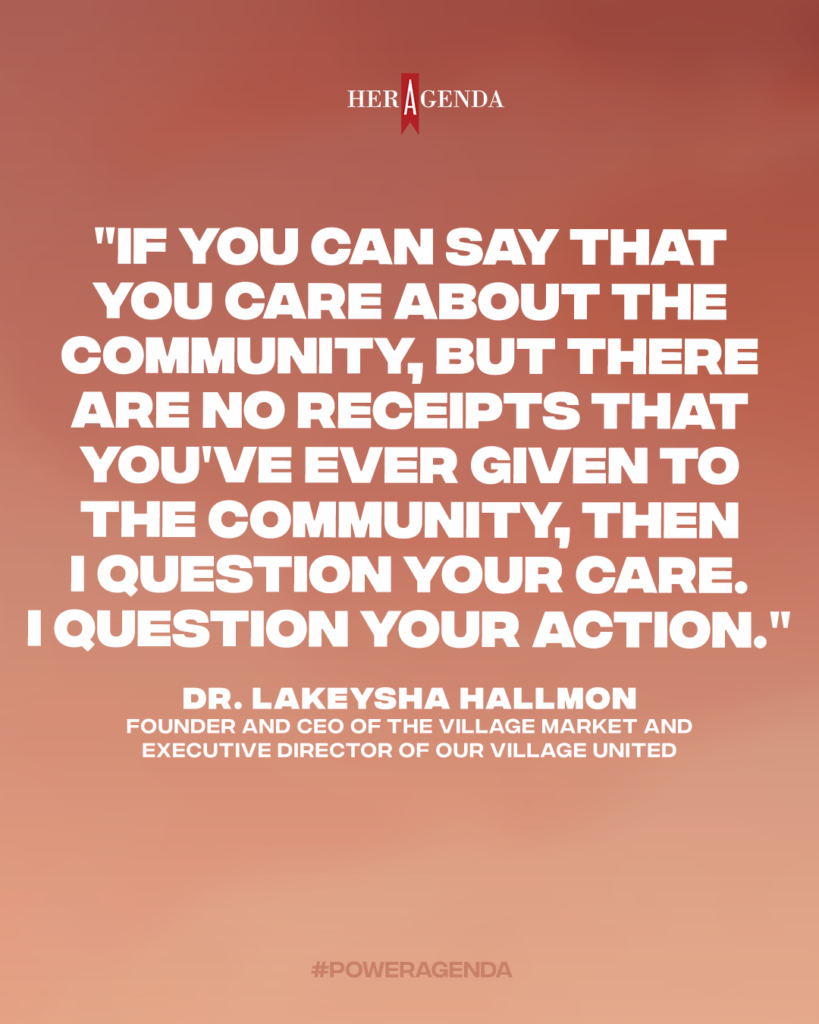
If we build businesses and communities, then everything around the community get better. It flows from the businesses to the schools, to the relationships with the local government, all of these things are tethered. So I targeted people who were just like me. Because I knew my pain points, I knew their pain points. I knew what intimidated me, so I knew the areas that intimidated them. I also knew that if I only supported these entrepreneurs and business operations in funding, I would have failed them. I had to make sure these entrepreneurs were not only positioned for funding, but that the operations got better, and that they could begin hiring. But if I didn’t get into their hearts and their minds, then they would be the byproduct of the same problems that persist now. It will just be another capitalistic structure, while only a few people do well.
I tell these entrepreneurs, I’m elevating you so you can be village-minded. So you can be a CEO who thinks about the humanity of the people who work with you. So you can honor them. So you can strive to hire people and employ them. Not minimum wage, but a living wage. If we don’t tackle that, then we rinse recycle repeat the problems, even though there may be more Black millionaires. But if you’re not village-minded, it won’t flow back to the community.
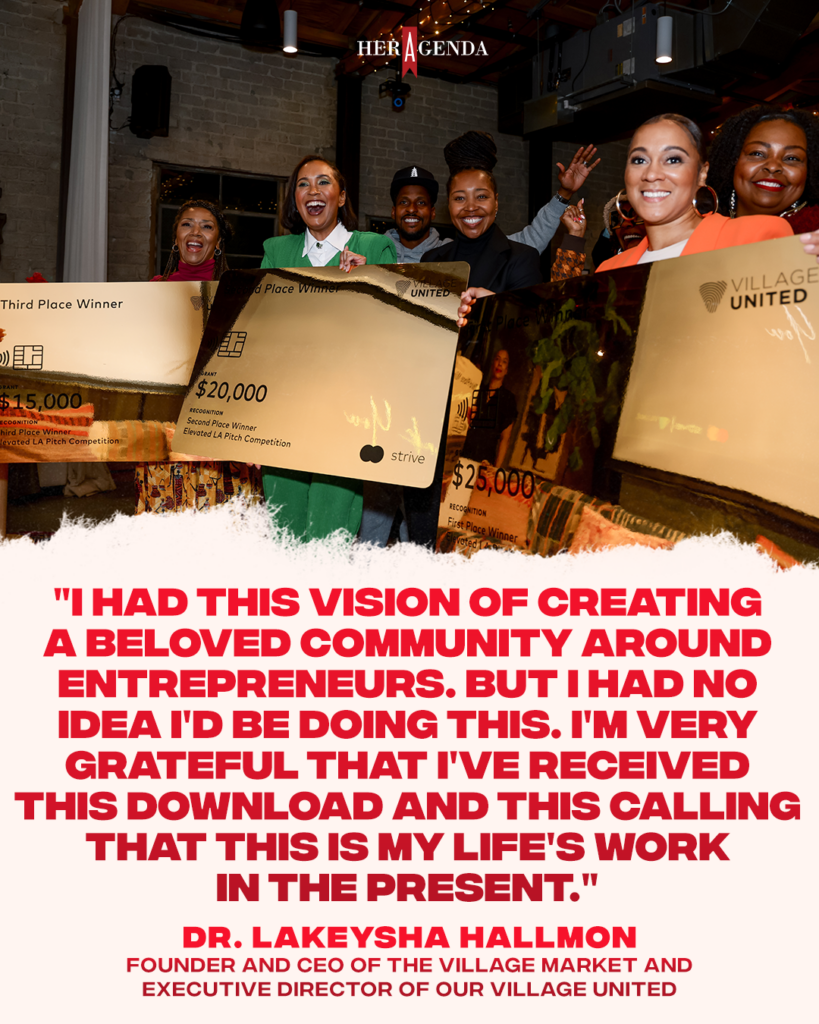
Her Agenda: What advice do you give to entrepreneurs when it comes to competition over collaboration? What’s your philosophy on approaching collaboration and the fears that come with it?
Dr. Lakeysha Hallmon: Healthy competition only makes iron sharpen iron. My team and my friends push me. When I hear that they’ve had an incredible year. I’m like oh okay, let’s go! That type of healthy competition is beautiful to me. But you know, another thing that pushes me even more? Being able to partner and collaborate with people and go higher together. I’m constantly talking to entrepreneurs and asking ‘How do we put our resources together? How do we put our money together to make a greater impact? How are we able to work with another person to establish trust and set clear intentions on what outcomes we want to have?’ That’s the conversation to have. I share with entrepreneurs, that I do not think you should jump into partnerships without having clear intentions. You have to be mission and vision-aligned. You can be different people, with different personalities, but when you close your eyes and think about where we’re trying to go, that story should be similar. That’s how you know that you’re sitting at the table with somebody who can actually see you. That is how you get to a place of having meaningful collaboration and partnership. That’s why founders have to understand the power of being able to be humble enough to work with other people, but confident enough to know what you bring to the table.
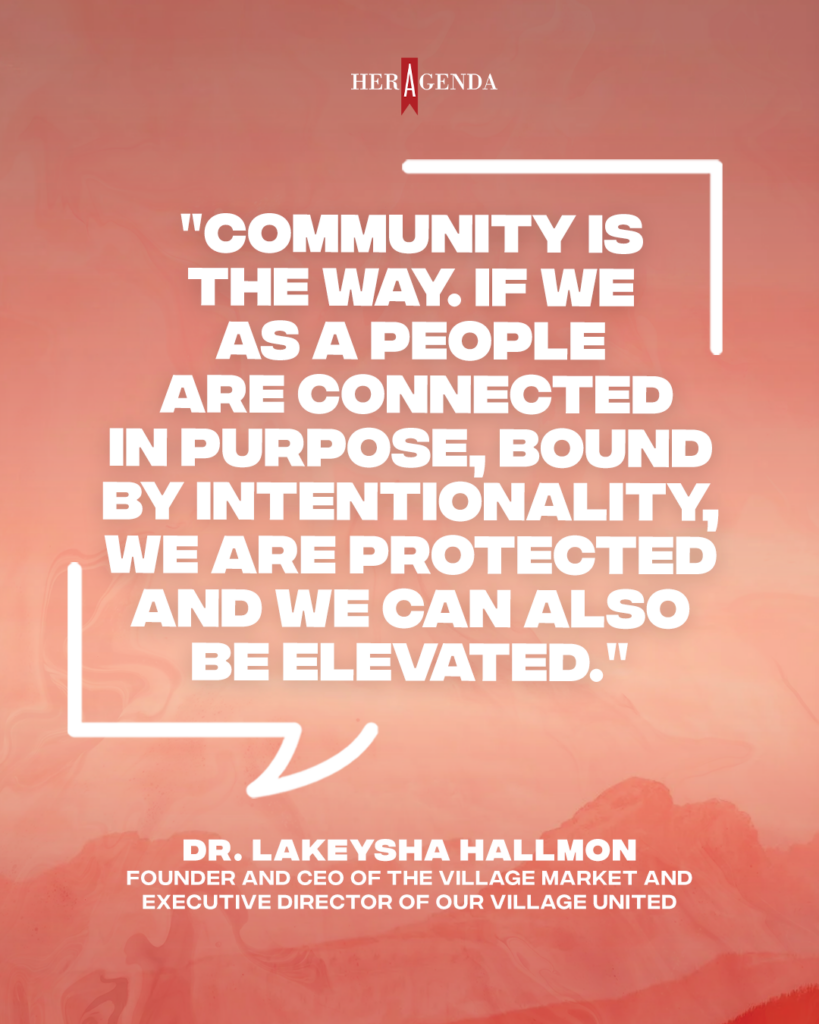
HerAgenda: Not only is that super inspiring, but I think that’s a perfect example of being able to go further together. Being mission and vision-aligned is key. As humans, we tend to want quick outcomes and can underestimate the significance of taking the time to navigate through difficult and intricate aspects of a process. It’s important to have uncomfortable conversations.
Dr. Lakeysha Hallmon: It’s uncomfortable because it’s like dating almost. Once you get past the cute stuff, you have to start asking those life questions. Like who are you as a person? How does your ego show up? How are you when you are stressed? What do you deeply care about? And how has your care shown up in the world, especially if you’re communal? If you can say that you care about the community, but there are no receipts that you’ve ever given to the community, then I question your care. I question your action. And so we have to be willing to be able to sit and talk through those things before we jump into business and partnership. So much potential was ruined by rushing into what seems like the thing we should be doing, rather than incrementally growing and figuring out how we put our funds, our talent, and our resources together to do something meaningful. I think we neglect the power of intentional conversation. We have to be willing to do deep assessments of people and partners to make sure that we are adopting things that we truly want to adopt. But I also understand and have deep compassion for when people neglect to do the deeper work with a partner because there are times when you just simply need the funding. Yet, I want founders to understand you don’t want the wrong money. You have to find the right partner.
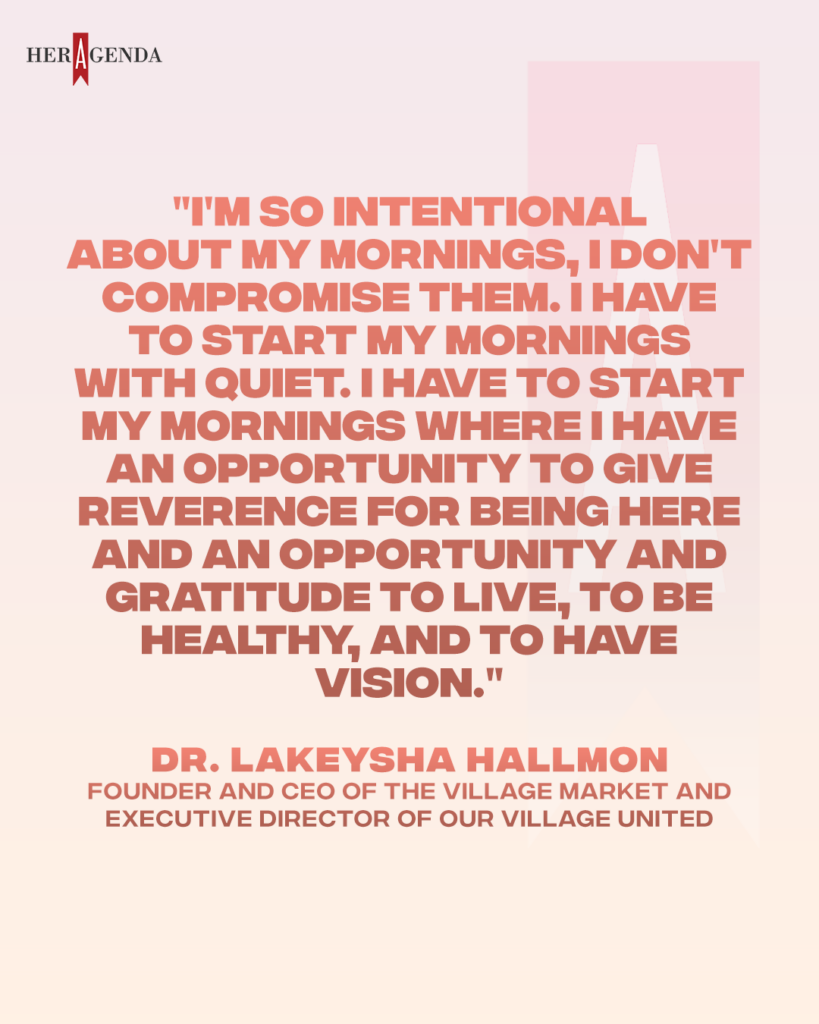
Her Agenda: We’ve seen how you give back to the community, but how do you get back to yourself? As you’re building this and creating these spaces, what are the self-care and mindset practices that you incorporate into your routine?
Dr. Lakeysha Hallmon: I’m only able to talk to you with such a clear mind today because I give to myself the most. I’m so intentional about my mornings, I don’t compromise them. I have to start my mornings with quiet. I have to start my mornings where I have an opportunity to give reverence for being here and an opportunity and gratitude to live, to be healthy, and to have vision. I give thanks for that every day. And then of course, I have to go to the gym because I think I’m an Olympian. I have to go work out every morning because it’s so good for my mental health. I feel so rejuvenated after I’ve had a really good workout with my trainer Frederick. I love our time in the morning and then when I get back home, I’m quiet again. I’m quiet because I’m making sure I drink my water, I’m making my smoothie, I’m adding all the green things that I need in my body because I feel like I’m feeding myself life. So I’m intentional about the first things that I eat, I’m intentional about the first things that I think, I’m intentional about tapping into my well-being and asking myself ‘How do I really feel? Is there anything that’s bringing me discomfort? Am I worried about anything? If anything comes to my spirit, I give myself a moment to sit in that. And I let myself know that I am going to be okay. I speak these words over myself often and I hope other founders know the power of their words. I also retreat in nature, going on long walks and having my [headphones] on because I don’t want people to talk to me, but nothing is playing in my ear. It’s just my way to kind of make myself invisible to the world for a moment. I just want to be in the air so I can breathe and take in the trees. I talk to people who I love and who make me laugh. I check in with my grandmother so I can get all of her wisdom. These are the things that I add to my cup every week. Because if I didn’t do these things and if I didn’t spend time in prayer, I would not be able to be a good steward of this work. I surround myself with people who genuinely love me. And I also genuinely love myself.
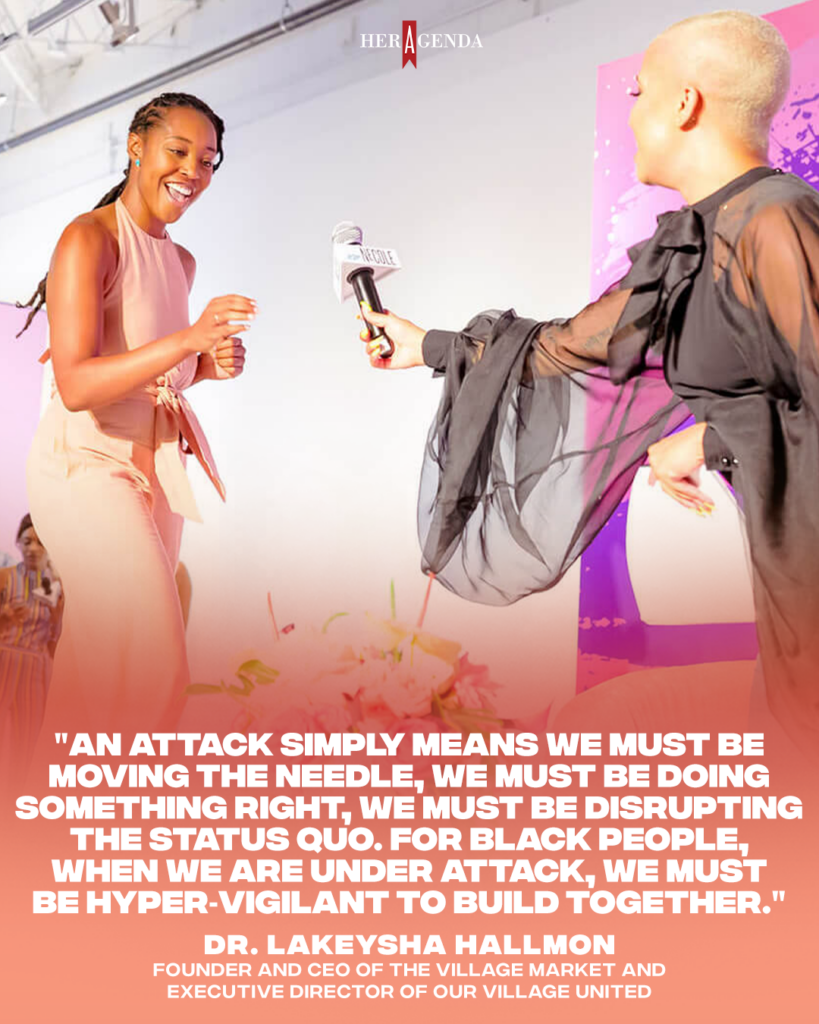
Her Agenda: Those are words to live by. Something that other founders can receive and embrace. We’re not doing burnout this year. Speaking of this year, do you have a word or intention for yourself for 2024?
Dr. Lakeysha Hallmon: My phrase is ‘peace in all things.’ I want peace in everything that comes my way. That’s how I know it’s God sent.
Her Agenda: Dr. Key, you’ve given so much to reflect on in this conversation. One thing that’s been heavy on the hearts and minds of many entrepreneurs is the attacks on resources and funding for Black founders, as we’ve seen with lawsuits against groups like Fearless Fund and Hello Alice. In the wake of these attacks, what challenge does this pose for you and how does that affect the focus of your business?
Dr. Lakeysha Hallmon: Historically, whenever there has been progress there, there have been protests. And so an attack simply means we must be moving the needle, we must be doing something right, we must be disrupting the status quo. For Black people, when we are under attack, we must be hyper-vigilant to build together. We must be hyper-vigilant to pool our resources together to make sure that grants do not stop and funding does not stop for Black founders. And we have to be clear that we are stronger together. This has not taken me away from my mission. It just affirmed to me that I am doing exactly what I should be doing. I love to disrupt a comfortable model. I love it. I find so much joy each time a founder excels. It beats the odds and breaks generational curses. So though the attack on Hello Alice, though the attack on Fearless Fund is happening, as I told Arian [Simone, CEO of Fearless Fund] every time that I see her that you are doing exactly what you are meant to do. Our job as a community is to embrace you, with our resources with our finances, and to make sure that you are held within a tight community. And one thing that Arian said when I saw her last week, I said how are you doing? She said ‘you know what I’m okay.’ She said ‘Doc, I got a strong village.’ And that is the answer. That is the answer that I wish that we all have. And that’s what I want for all of us to be able to say: ‘they are trying to break me but I remain unbroken because I have a strong village around me.’
[Editor’s note: This interview has been edited for length and clarity.]

